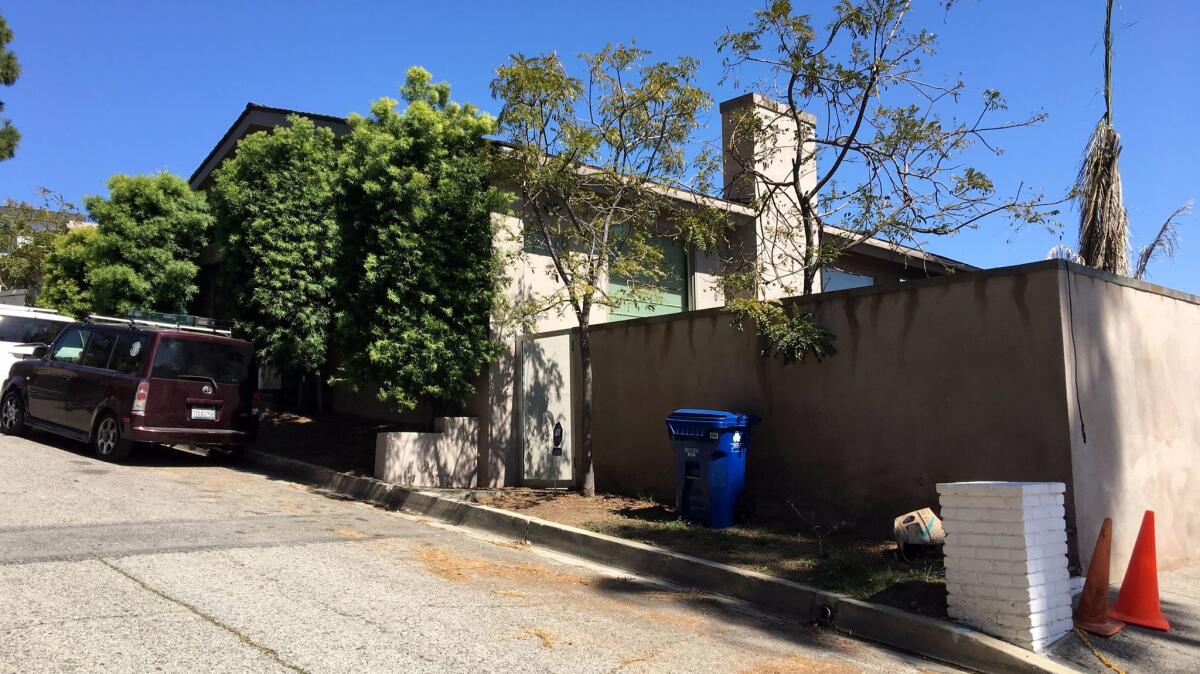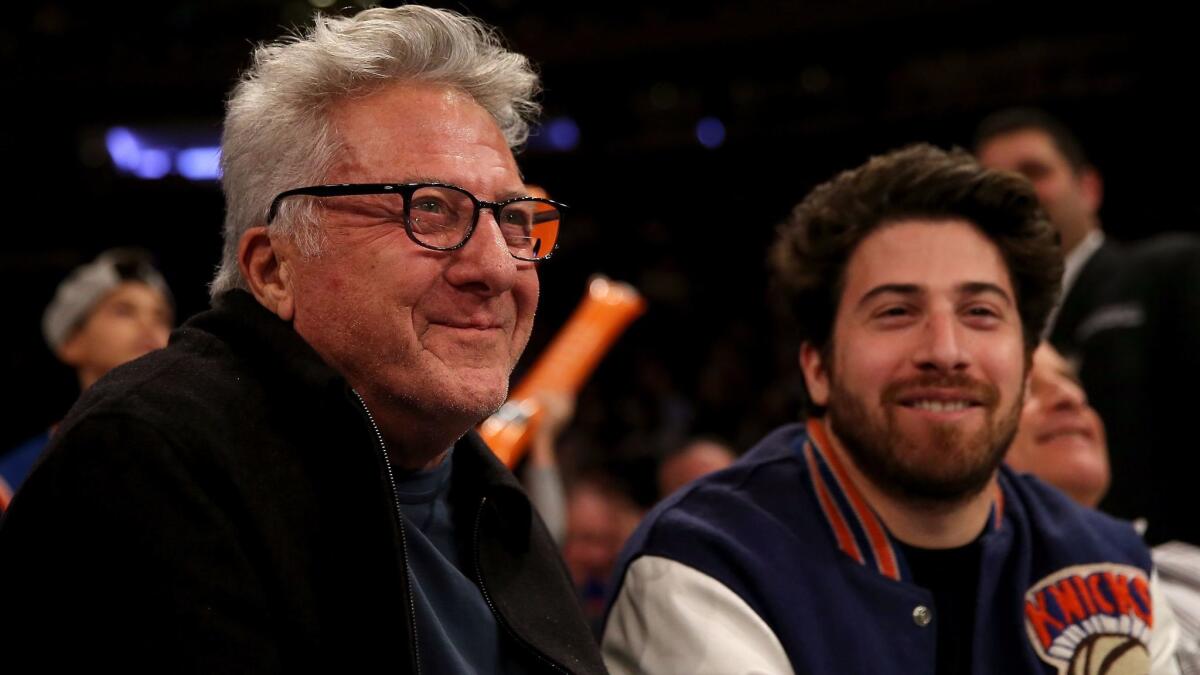$3-million real estate deal with Paul Manafort’s son-in-law goes south for Dustin Hoffman and son
It is the most famous street in one of Los Angeles’ most coveted neighborhoods.
High up in the hills above the Sunset Strip, Blue Jay Way is home to several A-list celebrities who enjoy panoramic views from glassy estates that can cost $10 million or more.
But a property on Blue Jay Way is now at the center of legal proceedings involving actor Dustin Hoffman and Jeffrey Yohai, a real estate developer who is the son-in-law of Paul Manafort, the former chairman of Donald Trump’s presidential campaign.
“The Graduate” actor and his son Jacob Hoffman invested $3 million with Yohai, who planned to raze a modest home on the street and build a $30-million mansion in its place, according to real estate records and Bankruptcy Court documents.
The deal has foundered as companies owning four of Yohai’s L.A.-area residential properties each went into foreclosure and then bankruptcy last year, including the Blue Jay Way parcel in the Bird Streets neighborhood. He’s also fighting a lawsuit in New York from an investor who alleges that he operated a Ponzi scheme. Yohai, 35, said in a filing that the allegations are fabrications.
The struggles of Yohai’s L.A. ventures and the presence of notable investors who put money into his properties offer a window into the city’s high-stakes residential development scene. In recent years, a flood of money has poured into building estates in locales such as Malibu, Brentwood and the Hollywood Hills.
The identities of the backers of these projects are increasingly being obscured via opaque ownership structures, which typically rely on limited liability companies to hold assets. Such was the case with the Hoffmans’ business with Yohai: their investment came through an LLC called DJ Blue Jay Way.
The Hoffmans weren’t the only high-profile investors in Yohai’s business. Manafort, his wife Kathleen and daughter Jessica — who is married to Yohai — invested $4.7 million in the developer’s L.A.-area projects, according to bankruptcy filings. The biggest of those investments was a $2.7-million loan made by Manafort last year to the now-bankrupt company that owns a property on Stradella Road in Bel-Air, documents show.
Manafort has had another real estate headache in recent months: Reports surfaced this week that he staved off the foreclosure of his Brooklyn, N.Y., townhouse after receiving $16 million in loans from a bank headed by a former Trump advisor.

That Dustin Hoffman and Manafort would have each given millions of dollars to Yohai makes them strange — albeit distant — bedfellows. Manafort, a longtime Republican political consultant, has come under intense scrutiny for his work for former Ukraine President Viktor Yanukovich, who has been accused of orchestrating the mass killings of protesters. Manafort resigned from the Trump campaign last summer in part over his work in Ukraine. Hoffman, meanwhile, has been a longtime supporter of Democrats, including former President Obama.
Representatives of Yohai and the Hoffmans did not respond to requests for comment. Manafort, his wife and daughter declined to comment on their investments with Yohai.
Companies controlling Yohai’s four L.A.-area properties — the ones on Blue Jay Way and Stradella Road and two others in Los Feliz — filed for Chapter 11 bankruptcy protection in December. The properties each entered foreclosure proceedings last year after Yohai defaulted on loans attached to them, real estate records show. They had been scheduled to be sold in trustee’s sales late last year, but that was delayed by the bankruptcies.
As part of Yohai’s bankruptcy proceedings, the Hoffmans’ DJ Blue Jay Way alleged that it invested $3 million in a company controlled by Yohai in June 2015. The money was claimed to be used to purchase the property on Blue Jay Way. A month later, Yohai completed the acquisition of the quarter-acre lot and 3,000-square-foot home for $7.5 million. The Hoffmans’ entity believed that the house would be torn down and replaced by a “luxury residence … having an ultimate sale of price of approximately $30 [million],” DJ Blue Jay Way contended. Renderings show a three-story modern home planned for the site.
DJ Blue Jay Way claimed that it received assurances from Yohai that he would not spend certain project funds without consent, but that some money was withdrawn by Yohai without the “prior knowledge or approval” of the Hoffmans’ company. The property went into default in August after Yohai’s LLC fell behind on its mortgage payments, and a notice for a trustee’s sale was filed in November, according to property records. There is no record of the Hoffmans being repaid and their company has asked the court to oppose a creditor’s motion to end the case quickly.
It is not clear how the Hoffmans came to know Yohai. A photograph from January 2015 shows Yohai and Jacob Hoffman, 36, at a live-music venue in Brooklyn. The younger Hoffman is also an actor whose credits include “I Heart Huckabees” and “The Wolf of Wall Street.”

As with many celebrity real estate transactions, the Hoffmans’ investment with Yohai was carefully shielded. In a filing with the California secretary of State, DJ Blue Jay Way lists as its address the office of a business management firm known to work with Dustin Hoffman. The filing makes no reference to the Hoffmans.
The Hoffmans also are not named in any of the bankruptcy proceedings. However, the father and son are named as managing members of DJ Blue Jay Way on an April 15 document related to a deed of trust on the property.
The Blue Jay Way parcel is in a prime location in the Bird Streets neighborhood, which gets its name from its avian-themed ways, drives and lanes. Blue Jay Way was immortalized in a psychedelic Beatles song of the same name, which was written by George Harrison in a house on the street in 1967. The Bird Streets have long attracted the rich and famous, including Leonardo DiCaprio, Tobey Maguire, Jodie Foster and Keanu Reeves.
On a recent afternoon, the street was abuzz with construction: Workers trudged in and out of job sites and trucks towing equipment rumbled up and down the narrow roadway, whose curbs were dotted with a smattering of Porta Potties.
Yohai’s real estate investments have extended well beyond the Hollywood Hills. But, as in California, at least one of his ventures in New York has soured.
Guy Aroch, a Manhattan-based fashion photographer, has claimed in a lawsuit that he invested $2.9 million in two of Yohai’s residential real estate projects, including a condominium, but never got his money back. Instead, according to the lawsuit, Yohai allegedly “used most or all” of Aroch’s investment for “personal travel; lavish purchases; and/or speculative ventures outside the investment mandates.” The lawsuit alleges that Yohai defaulted in October on a promissory note.
The complaint claims that Yohai “promises his investors a quick and large return on their investments,” but when “financial performance fails to materialize and investors express their concerns,” he recruits new investors and uses their funds to repay earlier ones. “In this regard, Yohai is believed to be operating a Ponzi scheme,” the lawsuit claims.
In a December filing, Yohai’s attorney asked the court to throw out the case on the grounds that it didn’t have jurisdiction to hear the matter, or strike “scandalous, immaterial and impertinent matter” from Aroch’s complaint. Yohai argued that Aroch’s lawsuit included “extremely derogatory” allegations.
Yohai’s filing also said that a reference in the lawsuit to him being a relative of Manafort is irrelevant and meant to embarrass the former Trump aide and attract publicity.
Aroch and his attorney, Joshua Abraham, declined to comment.
Los Angeles Times researcher Scott Wilson contributed to this report.
ALSO
Jared Kushner agrees to speak to Senate panel about his involvement with Russian officials
Paul Manafort has guided dictators and strongmen, but can he manage Donald Trump?
More to Read
Inside the business of entertainment
The Wide Shot brings you news, analysis and insights on everything from streaming wars to production — and what it all means for the future.
You may occasionally receive promotional content from the Los Angeles Times.











